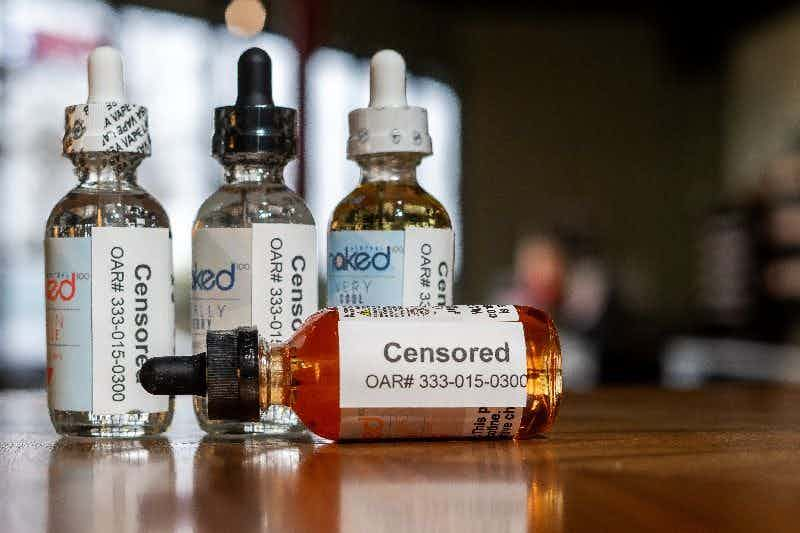An Oregon vape shop owner is suing the state over rules that prevent vendors from truthfully describing the vapor products they sell. Paul Bates, who owns two Portland vape shops called Division Vapor, is challenging the Oregon Health Authority on free speech grounds.
Oregon has strong free speech laws. According to the Goldwater Institute, which filed the lawsuit on Bates’ behalf, “The Oregon free-speech clause provides that ‘no law shall be passed restraining the expression of [speech] freely on any subject whatsoever.’ This means that, unless a recognized historical exception applies, the government cannot censor speech.”
But Oregon is doing just that, says Bates, by preventing him from using labels on e-liquid that have images or words that represent the flavors contained in the bottles, from regular e-juice to nic salt to even CBD vape juice. The state says the rules are necessary to protect children. But selling vapor products to minors is illegal, and Division Vapor doesn’t even allow minors (or adults under 21) inside the store, so the rules only serve to censor speech between adults about legal products.
“I started this business about five years ago, and it’s been hugely rewarding,” says Paul Bates. “We’re switching people from smoking to non-smokers, and yet now we have a law that prevents and stops us from having freedom of expression.”
We reported on Oregon’s packaging rules in September. They prohibit manufacturers and retailers from selling any e-cigarette vaping product (or inhalable cannabis products like CBD vapes to weed pens) from using images that include cartoons, celebrities, athletes, mascots, “fictitious characters played by people,” “other people likely to appeal to minors,” candy, desserts, soda, “food or beverages with sweet flavors including fruit or alcohol,” and “the shape of any animal, commercially recognizable toy, sports equipment, or commercially recognizable candy.”
They also restrict the words that can be used to describe vapor products. Vendors are not allowed to use the names of any fruit, candy, dessert, juice, soda, or alcoholic beverage. Additionally, descriptive adjectives are prohibited, including: tart, tangy, sweet, cool, fire, ice, lit, spiked, and poppin’.
Other label elements can be restricted too, if inspectors arbitrarily decide they meet the standard of being “likely to appeal to minors.” The lawsuit claims that the rules are “vague, incomprehensible, and overbroad.”
“This imprecision gives Defendants virtually unconstrained, arbitrary, standardless, and unfettered discretion in interpreting its statutes and regulations, and subjecting Plaintiffs to a continued threat of penalties,” contends the lawsuit. The rules apply to e-liquid that’s nicotine-free too.
"None of the adult customers in Bates’ shop get any benefit from not being able to read the labels on the bottles, and there are no children present to be protected."
Division Vapor employees actually spend hours every week covering the offending images and words with labels that say “Censored OAR #333-015-0300.” That number is the Oregon administrative regulation that forces the censorship. It’s time wasted. None of the adult customers in Bates’ shop get any benefit from not being able to read the labels on the bottles, and there are no children present to be protected. The rules amount to regulatory harassment.
“While proponents of Oregon’s regulations say they’re trying to protect children, these rules not only hurt consumers, but they hurt the free speech rights of hardworking small business owners trying to make a living,” Goldwater Institute Senior Attorney Matt Miller explains.
The lawsuit was filed in the Oregon State Circuit Court in Multnomah County, and names the Oregon Health Authority and OHA Director Patrick Allen as defendants. Bates is asking the court to declare the law underlying the rules unconstitutional, and to prevent the OHA from enforcing the administrative rules.
The Goldwater Institute is a conservative/libertarian think tank and litigation organization, based in former senator and presidential candidate Barry Goldwater’s home state of Arizona. The institute supports free markets and limited government.
Note
Image courtesy Stray Fox Photography.

Jim McDonald
Vaping for: 13 years
Favorite products:
Favorite flavors: RY4-style tobaccos, fruits
Expertise in: Political and legal challenges, tobacco control haters, moral panics
Jim McDonald
Smokers created vaping for themselves without help from the tobacco industry or anti-tobacco crusaders, and I believe vapers and the vaping industry have the right to continue innovating to give everyone who wants to use nicotine access to safe and attractive non-combustible options. My goal is to provide clear, honest information about vaping and the challenges nicotine consumers face from lawmakers, regulators, and brokers of disinformation. You can find me on Twitter @whycherrywhy


